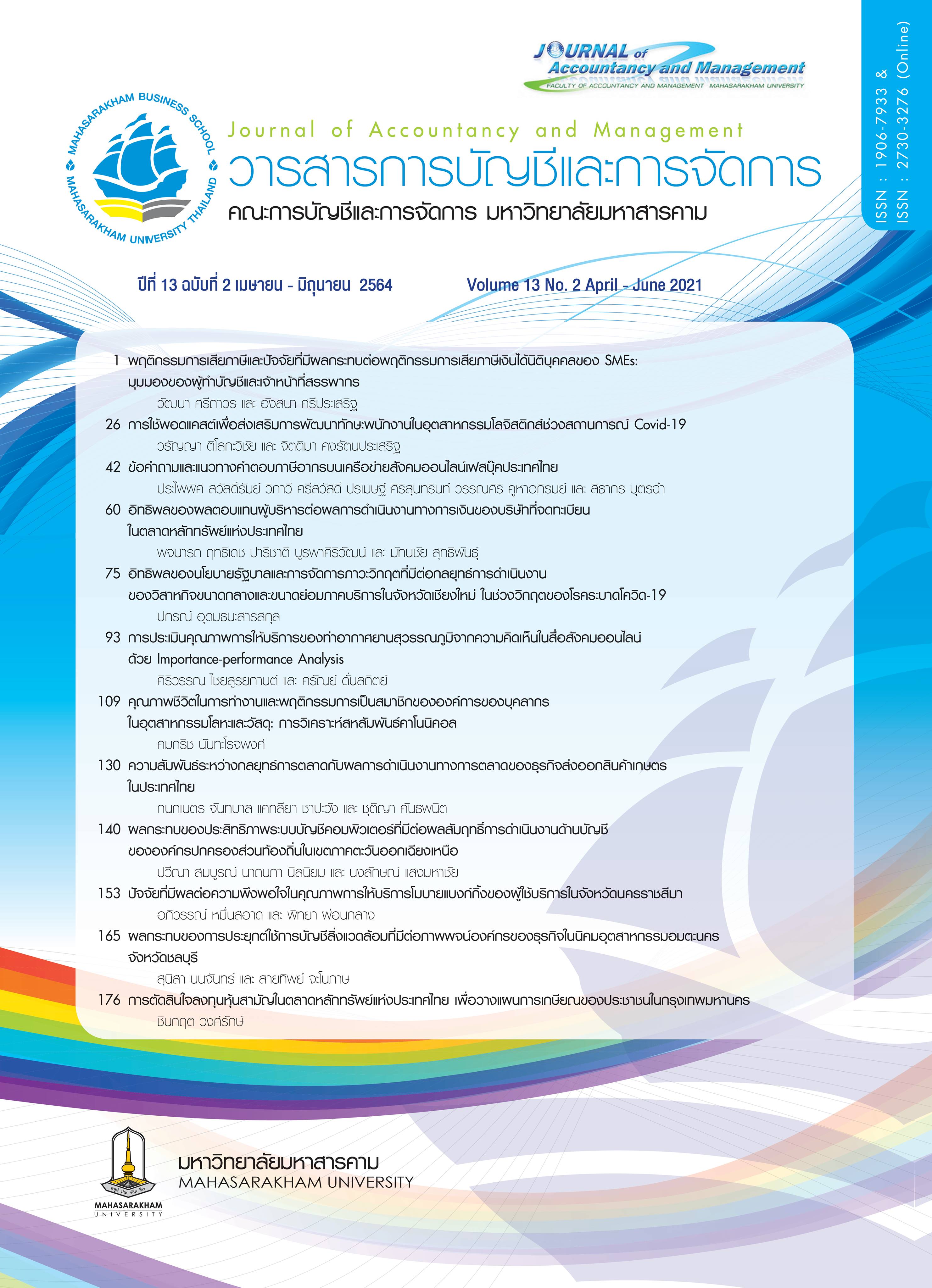พฤติกรรมการเสียภาษีและปัจจัยที่มีผลกระทบต่อพฤติกรรมการเสียภาษีเงินได้ นิติบุคคลของ SMEs : มุมมองของผู้ทำบัญชีและเจ้าหน้าที่สรรพากร
Main Article Content
บทคัดย่อ
งานวิจัยนี้มีวัตถุประสงค์ เพื่อศึกษาความคิดเห็นที่มีต่อพฤติกรรมการเสียภาษีและปัจจัยที่ส่งผลต่อพฤติกรรมการเสียภาษีเงินได้นิติบุคคลของ SMEs มุมมองของผู้ทำบัญชีและเจ้าหน้าที่สรรพากร เก็บรวบรวมข้อมูลโดยใช้แบบสอบถามที่ผ่านการพิจารณาความถูกต้องของเนื้อหาและทดสอบความเชื่อถือได้ด้วยค่า Cronbach’s Alpha ได้เท่ากับ 0.875 แบบสอบถามที่ส่งทางไปรษณีย์ได้รับคืนมาทั้งสิ้น 617 ชุด คิดเป็นอัตราตอบกลับเท่ากับ 61.70% ใช้สถิติเชิงพรรณนาในการสรุปความคิดเห็น ทดสอบความแตกต่างความคิดเห็นระหว่างกลุ่มด้วยวิธี t-test วิเคราะห์ผลกระทบของปัจจัยที่มีต่อพฤติกรรมการเสียภาษีของ SMEs ด้วยวิธีวิเคราะห์ความถดถอยเชิงพหุ กำหนดนัยสำคัญทางสถิติที่ระดับ .05
ผลการวิจัยชี้ให้เห็นว่า ผู้ทำบัญชีและเจ้าหน้าที่สรรพากรมีความคิดเห็นต่อปัจจัยที่ส่งผลต่อพฤติกรรม
การเสียภาษีเงินได้นิติบุคคลของ SMEs ในด้านการส่งเสริมการเสียภาษีและด้านสภาพแวดล้อมทางธุรกิจสอดคล้องกัน แต่ต่างกันในด้านกฎหมาย และด้านประสิทธิภาพการจัดเก็บภาษีอย่างมีนัยสำคัญ รวมทั้งพฤติกรรมการเสียภาษีเงินได้นิติบุคคลของ SMEs สำหรับมุมมองในด้านของผลกระทบของปัจจัยด้านต่างๆ ที่มีต่อพฤติกรรมการเสียภาษีเงินได้นิติบุคคลของ SMEs พบว่าในกลุ่มผู้ทำบัญชี ปัจจัยที่มีผลกระทบต่อพฤติกรรมการเสียภาษีเงินได้นิติบุคคลของ SMEs อย่างมีนัยสำคัญ คือ ปัจจัยด้านกฎหมาย และด้านทัศนคติผู้เสียภาษี ในขณะที่กลุ่มเจ้าหน้าที่สรรพากรเห็นว่าปัจจัยด้านประสิทธิภาพการจัดเก็บภาษี และด้านสภาพแวดล้อมทางธุรกิจ เป็นปัจจัยที่ส่งผลกระทบต่อพฤติกรรมการเสียภาษีเงินได้นิติบุคคลของ SMEs อย่างมีนัยสำคัญ ดังนั้น มุมมองที่แตกต่างกันนี้อาจเป็นอุปสรรคต่อการเพิ่มประสิทธิภาพการจัดเก็บภาษีของรัฐ ซึ่งกรมสรรพากรและผู้ทำบัญชีให้กับ SMEs ควรร่วมมือกันในการทำให้การเสียภาษีเงินได้นิติบุคคลของ SMEs เป็นไปอย่างถูกต้องมากขึ้น
Downloads
Article Details
บทความที่ได้รับการตีพิมพ์เป็นลิขสิทธิ์ของวารสารการบัญชีและการจัดการ
ข้อความที่ปรากฏในบทความแต่ละเรื่องในวารสารวิชาการเล่มนี้เป็นความคิดเห็นส่วนตัวของผู้เขียนแต่ละท่านไม่เกี่ยวข้องกับมหาวิทยาลัยมหาสารคาม และคณาจารย์ท่านอื่นๆในมหาวิทยาลัยฯ แต่อย่างใด ความรับผิดชอบองค์ประกอบทั้งหมดของบทความแต่ละเรื่องเป็นของผู้เขียนแต่ละท่าน หากมีความผิดพลาดใดๆ ผู้เขียนแต่ละท่านจะรับผิดชอบบทความของตนเองแต่ผู้เดียว
เอกสารอ้างอิง
กรมสรรพากร. (2561). รายงานประจำปีของกรมสรรพากร พ.ศ. 2561. ค้นเมื่อ 9 ธันวาคม 2563, จาก https://www.rd.go.th/publish/22590.0.html.
ชาติชาย ศรีคงรักษ์. (2559). ความคิดเห็นของประชาชนต่อการจัดเก็บภาษีขององค์การบริหารส่วนตำบลคลองขุด อำเภอท่าใหม่ จังหวัดจันทบุรี. งานนิพนธ์รัฐประศาสนศาสตรมหาบัณฑิต มหาวิทยาลัยบูรพา.
ไพฑูรย์ คุ้มคง. (2557). ความคิดเห็นของประชาชนต่อคุณภาพการให้บริการของเทศบาลตำบลนายายอาม อำเภอนายายอาม จังหวัดจันทบุรี. งานนิพนธ์รัฐประศาสนศาสตรมหาบัณฑิต มหาวิทยาลัยบูรพา.
ประพนธ์ บุนนาค. (2504). การคลัง. พิมพ์ครั้งที่ 2, กรุงเทพฯ : โรงพิมพ์เจริญสิน.
นิพนธ์ เห็นโชคชัยชนะ และสิงห์ชัย อรุณวุฒิพงศ์. (2558). การบัญชีภาษีอากร. กรุงเทพฯ : ห้างหุ้นส่วนจำกัดทีพีเอ็นเพรส.
รังสรรค์ ธนะพรพันธ์. (2527). คำนิยามของภาษีอากร: พรมแดนแห่งความรู้. สรรพากรสาสน์, 31 (5), 93-129.
เริงชัย อรรคทิมากูล. (2558). มาตรการจูงใจทางภาษีเพื่อส่งเสริมการวิจัยและพัฒนา: ศึกษาการเครดิตภาษี การหักรายจ่ายเพิ่มเติมการหักค่าสึกหรอและค่าเสื่อมราคาในอัตราเร่ง. วิทยานิพนธ์มหาบัณฑิต มหาวิทยาลัยธรรมศาสตร์.
วริทธิ์ คัมภีพันธ์. (2554). สิทธิประโยชน์ทางภาษีของคณะกรรมการส่งเสริมการลงทุนและภาระภาษีเงินได้นิติบุคคล. วิทยานิพนธ์มหาบัณฑิต จุฬาลงกรณ์มหาวิทยาลัย.
วรรณวิสา หนูห้อง และสุเทพ บูรณะคุณาภรณ์. (2559). การศึกษาปัจจัยที่มีผลต่อการจัดเก็บภาษีเงินได้นิติบุคคลของประเทศไทย. วารสารเศรษฐศาสตร์ มหาวิทยาลัยรามคำแหง, 2 (2), 53-60.
วัลลภ รัฐฉัตรานนท์. (2555). วิธีและเทคนิคในการวิจัยทางรัฐศาสตร์. กรุงเทพฯ : ทองกมล.
วิฑูรย์ ฐานเมธี. (2554). ความคิดเห็นของประชาชนต่อการบริหารกิจการคณะสงฆ์ในจังหวัดหนองบัวลำภู. วิทยานิพนธ์มหาบัณฑิต มหาวิทยาลัยจุฬาลงกรณราชวิทยาลัย.
ศุภนารี พิรส จงกล เพชรสุข และชนเมศ เพชรประดิษฐ์. (2563) ผลกระทบของจริยธรรมในการประกอบธุรกิจที่มีต่อผลการดำเนินงานของผู้ประกอบการวิสาหกิจขนาดกลางและขนาดย่อมในจังหวัดพิษณุโลก. วารสารการบัญชีและการจัดการธุรกิจ มหาวิทยามหาสารคาม, 12 (4), 43-54.
สมศักดิ์ ประถมศรีเมฆ, กรวิภา เทียนภาสกร, จัญจลา ศิวะมาศ และขวัญนุช เจริญวัฒนวิญญู. (2559). ปัจจัยที่ส่งผลต่ออัตราภาษีเงินได้นิติบุคคลที่แท้จริง กรณีศึกษาจากตลาดหลักทรัพย์แห่งประเทศไทย. วารสารการจัดการธุรกิจ มหาวิทยาลัยบูรพา คณะการจัดการและการท่องเที่ยว, 5 (1), 101-111.
สมหมาย ศิริอุดมเศรษฐ. (2561). แนวทางการจัดเก็บภาษีของรัฐเพื่อการแก้ไขปัญหาความเลื่อมล้ำและเสริมสร้างความมั่นคงทางเศรษฐกิจ. สารนิพนธ์ หลักสูตรการป้องกันราชอาณาจักร วิทยาลัยป้องกันราชอาณาจักร.
สำนักงานส่งเสริมวิสาหกิจขนาดกลางและขนาดย่อม. (2562). รายงานสถานการณ์ SMEs ปี 2562. ค้นเมื่อ 24 มกราคม 2564, จาก https://www.sme.go.th.
สำนักงานเศรษฐกิจการคลัง. (2557). รายงานวิจัยสำนักงานเศรษฐกิจการคลัง. ค้นเมื่อ 10 กุมภาพันธ์ 2564, จาก https://www.fpo.go.th.
อรัญ ธรรมโน. (2507). การคลัง. กรุงเทพฯ : การพิมพ์พระนคร.
Abrie, W. & Doussy, E. (2006). Tax compliance obstacles encountered by small and medium enterprises in South Africa. Meditari Accountancy Research, 14 (1), 1-13.
Adam, S. (1976). An Inquiry into the Nature & Causes of the Wealth of Nations. Los Engeles, California.
Agnes, M. (2003). Webster's new world dictionary. Simon and Schuster.
Allingham, M. G., & Sandmo, A. (1972). Income Tax Evasion: A Theoretical Analysis. Journal of Public Economics, 1 (3-4), 323–338.
Alm, J., McClelland, G. H., & Schulze, W. D. (1992). Why do people pay taxes?. Journal of public Economics, 48 (1), 21-38.
Becker, G. S. (1968). Crime and Punishment: An Economic Approach. Journal of Political Economy, 7 (6), 169–217.
Bello, K. B., & Danjuma, I. (2014). Review of models/theories explaining tax compliance behavior. Sains Humanika, 2 (3), 451-475.
Fjeldstad, O., Schulz-Herzenberg, C., & Sjursen, I. (2012). Peoples’ View of Taxation in Africa: A Review of Research on Determinants of Tax Compliance. CMI working paper, WP2012: 7.
Franzoni, Luigi A. (2000). “Tax evasion and tax compliance”. In Encyclopedia of Law and Economics, vol. IV, edited by Bouckaert, Boudewijn and De Geest, Gerrit, 51-94. Cheltenham : Edward Elgar.
Frey, B. S., & Feld, L. P. (2002). Deterrence and morale in taxation: An empirical analysis. Available at SSRN 341380.
Graetz, M. J., & Wilde, L. L. (1985). The economics of tax compliance: fact and fantasy. National Tax Journal, 38 (3), 355-363.
Hyun, J. K. (2005). The Compliances in Korea and Japan: Why are they Different. Journal of Economic Literature H, 7 (1), 135-153.
Jérémie, R. (2014). The Ethics of corporate Income Taxation and Corporate Income Tax Sheltering. Journal of Accounting Ethic & Public and Policy, 15, (2), 597-621.
Kirchler, E. (2007). The Economic Psychology of Tax Behaviour. Cambridge University Press.
Kirchler, E., Hoelzl, E., & Wahl, I. (2008) “Enforced versus voluntary tax compliance: The ʻslippery slopeʼ framework”. Journal of Economic Psychology, 29 (2), 210–225.
Likert, R. (1932). A technique for the measurement of attitudes. Archives of Psychology, 22 (140), 1-55.
McKerchar, M. A., & Evans, C. (2009). Sustaining Growth in Developing Economies Through Improved Taxpayer Compliance: Challenges for Policy Makers and Revenue Authorities. E Journal of Tax Research. 7. 10.2139/ssrn.1415164.
Mikesell, J., & Birskyte, L. (2007). Another View of IRS Results: A Comment on Rainey and Thompson, Public Administration Review, 67 (3), 574-576.
Moohr, G. S. (2009). Tax Evasion as White Collar Fraud. Houston Business and Tax Law Journal,9, 208-220.
Oyedokun, G. E. (2016). Relevance of tax audit and tax investigation in Nigeria. SSRN Electronic Journal, 1-16.
Picur, R. D. & Riahi‐Belkaoui, A. (2006). The impact of bureaucracy, corruption and tax compliance. Review of Accounting and Finance, 5 (2), 174-180.
Pragua, C. (2010). Addressing tax evasion and tax avoidance in developing countries. Eschborn, Germany: Deutsche Gesellschaft für. Retrieved August 30, 2020 from https://www.taxcompact.net/documents/2010-12-22_GTZ_Addressing-tax-evasion-and-avoidance.pdf
Prest, A. R. (1972). The Select Committee on Corporation Tax. BTR, 15.
Prest, A. R. (1973). Public Finance: Backward Area or New Frontier?. Economica, 40 (158), 121-135.
Richupan, S. (1984). Income tax evasion: A review of the measurement of techniques and some estimates for the developing countries, Department Memorandum No. DM/84/46, The International Monetary Fund. Washington, DC: Fiscal Affairs Department.
Slemrod, J. (2007). Cheating Ourselves: The Economics of Tax Evasion. Journal of Economic Perspectives, 21 (1), 25–48.
Sorg, J. D. (1983). A typology of implementation behaviors of street‐level bureaucrats. Review of Policy Research, 2 (3), 391-406.
Sour, L. (2004). An economic model of tax compliance with individual morality and group conformity. Economía Mexicana. Nueva Época, 13 (1), 43-61.
Tanzi, V. (2000). Policies, Institutions and the Dark Side of Economics. Northampton: Edward Elgar.
Torgler, B., & Schneider, F. (2007). What shapes attitudes toward paying taxes? Evidence from multicultural European countries. Social Science Quarterly, 88 (2), 443-470.
Tyler, T. R. & Bies, R. J. (1990). Applied social psychology and organizational settings. Hillsdale, NJ: Erlbaum.


